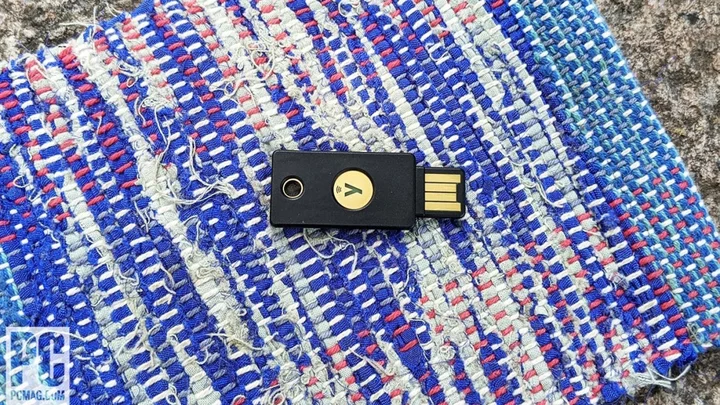Multi-factor authentication (MFA) is the best way to secure your online accounts, and the most secure way to do MFA is likely with hardware security keys like the Yubico Security Key NFC. This device looks identical to its YubiKey cousins and retains wireless NFC support, but it trades advanced features for an exceptionally affordable price. Its USB-A connector means that it's probably not the most forward-looking purchase, but even so we recommend it and Editors' Choice winner Yubico Security Key C NFC as the best places to start when looking at security keys.
What Is a Security Key?
Even if you use a password manager to generate unique and complex passwords for every site and service, that won't stop an attacker who obtains your password from a data breach or phishing attack. Enter MFA, which requires that anyone trying to access your account present at least two "factors" to authenticate.
The easiest way to do MFA (sometimes called two-factor authentication or 2FA) is with codes sent via SMS, but those can be intercepted. The most accessible form of MFA is to use codes generated from an authenticator app on your phone, but these require that your phone be charged and functional. Security keys often have no moving parts or batteries and are purpose-built to resist physical attacks as well.
Security keys might be the most secure MFA option, but they have drawbacks. For one, losing your key can mean you're locked out of your account. For another, security keys still have not achieved widespread support—even among services that offer MFA. For both of those reasons, you'll likely need to use an authenticator app as well.
Hands On With the Security Key NFC
The $25 Security Key NFC is small enough to fit comfortably on your keychain, and sturdy enough to survive the scrapes and scratches that come with that. It measures just 0.13 by 0.71 by 1.8 inches (HWD), which is just a little smaller than its $29 counterpart, the Security Key C NFC (pictured on top below). They're also both IP68 rated, meaning they're dustproof and can survive immersion in water.
(Credit: Max Eddy)Besides size, the only physical difference between the two models is their connectors. The Security Key NFC has a flat, unshielded USB-A connector, and the Security Key NFC has a standard USB-C connector. The Security Key NFC's exposed contacts will see more wear and tear than USB-C, but I've carried nearly identical security keys for years without issue. The USB-A support also means it is compatible with innumerable older devices and dongles.
I tested the Security Key NFC alongside the Security Key C NFC, and they both performed equally well. Read that review for a complete breakdown of my testing, but the upshot that I had no trouble enrolling the Security Key NFC and then using it to log in. I tested both keys on two different macOS browsers, as well as a Pixel 3 and an iPhone 13 mini.
(Credit: Max Eddy)The only issue I had with the Security Key NFC was logging in to Mastodon on the Pixel 3. That phone has a USB-C port, so I couldn't just plug in the key. Fortunately, NFC doesn't require a connector at all and the Security Key NFC was entirely usable. It did take the Pixel 3 several tries to work with both models, which I chalk up to the age of the phone.
I also tested two passwordless login methods with the Security Key NFC. First, I enrolled it with my Microsoft account and then logged in with only my key, sans password. Security keys can also be used to store passkeys—a new technology that might do away with passwords entirely. I easily created a new passkey for my Google account on the Security Key NFC and then used it to log in without a password.
(Credit: Max Eddy)How the Security Key NFC Compares
Beneath its tough, plastic exterior, the Security Key NFC supports the authentication standards you're most likely to encounter online: FIDO2 (CTAP1/CTAP2), U2F, and WebAuthn. To get more features, you need to make a significant jump in price.
At its price, the Security Key NFC is most comparable to other low-cost, entry-level security keys, such as the $30 Google Titan Security Key and the 29 euro ($32.48 at time of writing) Nitrokey FIDO2. The Titan devices are extremely well made, but are often out of stock and support fewer authentication systems than the Security Key NFC.
(Credit: Max Eddy)The Nitrokey FIDO2, on the other hand, hangs its hat on open-source hardware and firmware. Notably, it uses a shielded USB-A connector and includes a plastic cap for extra protection. The Nitrokey is much bulkier than the Security Key NFC and can’t match its build quality. It also doesn't support NFC.
The YubiKey 5 NFC is $50 and, along with the other variants in the YubiKey 5 series, it supports all the standards of the Security Key NFC but also OATH-TOTP, OATH-HOTP, OpenPGP, smart card authentication (PIV), and Yubico OTP. YubiKey models can also be customized further, like for replaying a static password.
If you want to add biometrics into the mix, the price goes even higher. The Kensington VeriMark Guard USB-C Fingerprint Key is $69.99 and the YubiKey Bio is a hefty $90.
(Credit: Max Eddy)Excellent, but Not Future-Proof
The Security Key NFC is a unicorn of a product. It has excellent build quality and supports all the most important features (though not the most features). Best of all, it does so for just $25, making it easily affordable for curious consumers. The only thing that holds it back is its connector.
USB-C is almost certainly destined to be the standard connector for consumer electronics. The Apple laptop I'm writing this on only has USB-C ports, and I'm always slightly annoyed when I have to dig out a micro USB cord in 2023. That said, USB-A has some advantages. Its larger connector gives a stronger, firmer connection than USB-C. It's also compatible with decades of devices; if you're using an older machine then USB-A is probably more convenient.
If any of those situations apply to you, then the Security Key NFC is the way to go. However, it gets a lower rating than the Editors' Choice winning Security Key C NFC, which is more compatible going forward. Either is a good choice for anyone considering a security key for the first time, but we recommend the YubiKey 5C NFC for anyone that can take advantage of its advanced features.
What Is Two-Factor Authentication?








